Here is a sample of the data that I have after pushing two JSON objects into an array. Accessing the data is simple. If I wanted to access say the logo, I could use example[0].channels.logo. However, when attempting to access the same array from a JSONP call, the result is undefined.
let example =
[
{
"channels": {
"mature": false,
"status": "Some GoLang Today #go #golang #youtube",
"broadcaster_language": "en",
"display_name": "FreeCodeCamp",
"game": "Creative",
"language": "en",
"_id": 79776140,
"name": "freecodecamp",
"created_at": "2015-01-14T03:36:47Z",
"updated_at": "2018-04-11T22:33:06Z",
"partner": false,
"logo": "https://static-cdn.jtvnw.net/jtv_user_pictures/freecodecamp-profile_image-d9514f2df0962329-300x300.png",
"video_banner": "https://static-cdn.jtvnw.net/jtv_user_pictures/freecodecamp-channel_offline_image-b8e133c78cd51cb0-1920x1080.png",
"profile_banner": "https://static-cdn.jtvnw.net/jtv_user_pictures/freecodecamp-profile_banner-6f5e3445ff474aec-480.png",
"profile_banner_background_color": null,
"url": "https://www.twitch.tv/freecodecamp",
"views": 210806,
"followers": 11582,
"_links": {
"self": "https://api.twitch.tv/kraken/channels/freecodecamp",
"follows": "https://api.twitch.tv/kraken/channels/freecodecamp/follows",
"commercial": "https://api.twitch.tv/kraken/channels/freecodecamp/commercial",
"stream_key": "https://api.twitch.tv/kraken/channels/freecodecamp/stream_key",
"chat": "https://api.twitch.tv/kraken/chat/freecodecamp",
"features": "https://api.twitch.tv/kraken/channels/freecodecamp/features",
"subscriptions": "https://api.twitch.tv/kraken/channels/freecodecamp/subscriptions",
"editors": "https://api.twitch.tv/kraken/channels/freecodecamp/editors",
"teams": "https://api.twitch.tv/kraken/channels/freecodecamp/teams",
"videos": "https://api.twitch.tv/kraken/channels/freecodecamp/videos"
},
"delay": null,
"banner": null,
"background": null
}
},
{
"streams": {
"stream": null,
"_links": {
"self": "https://api.twitch.tv/kraken/streams/freecodecamp",
"channel": "https://api.twitch.tv/kraken/channels/freecodecamp"
}
}
}
]
// all of these work
console.log(example);
console.log(example[0]);
console.log(example[0].channels);
console.log(example[0].channels);
Here is the function that handles each JSONP request - each response is stored in an object with property name of the defined route argument.
const jsonpCall = (route, channel) => {
let result = {};
$.ajax({
url: `https://wind-bow.gomix.me/twitch-api/${route}/${channel}?callback=?`,
dataType: 'jsonp',
success: function(data){
result[route] = data;
},
});
return result;
};
This is the function call that groups two returned objects into one array, and then hands off that array for another function to sort through/reduce to an object.
const channelsToSearch = ["freecodecamp","nba","shroud"];
channelsToSearch.forEach(channel => {
const channelData = [];
channelData.push(jsonpCall("channels",channel));
channelData.push(jsonpCall("streams",channel));
console.log(sortData(channelData));
});
This is where the problem begins. This function takes the array of two objects, and begins working on creating a new object to return. It can't access the object.
const sortData = arr => {
console.log(arr); // okay!
console.log(arr[0]); // okay!
console.log(arr[0].channels); // undefined?
const obj = {};
obj.logo = arr[0].channels.logo;
obj.displayName = arr[0].channels["display_name"];
arr[1].streams.stream === null ? obj.status = "Offline" : obj.status = arr[1].streams.stream.channel.status;
return obj;
};
I'm not sure what to discern from the differences in the logs.
The first three logs are from the example logs.
The last three logs are from the sortData function.
The final error is from the obj.logo = arr[0].channels.logo; line in the sortData function.
